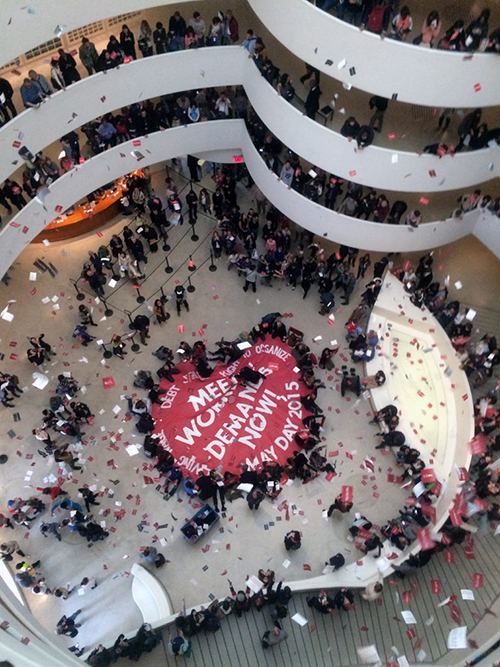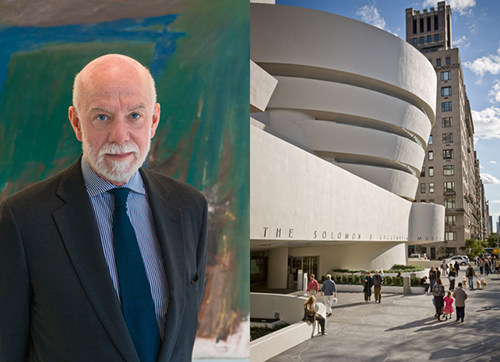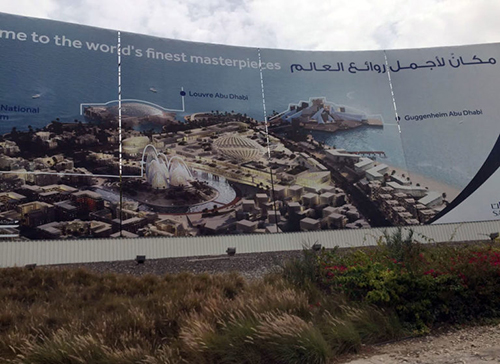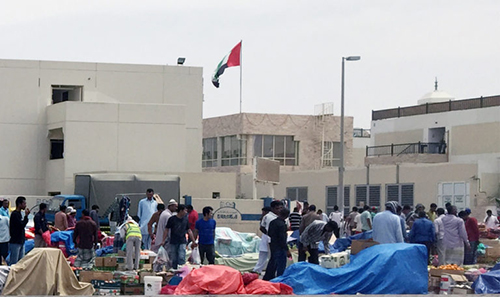A view in March 2015 of one of the many illegal markets set up by migrant laborers in the Abu Dhabi worker camps (photo the author for Hyperallergic)
The signatories of the GLC statement are Amin Husain, Andrew Ross, Ashok Sukumaran, Ayreen Anastas, Doris Bittar, Doug Ashford, Eric Baudelaire, Gregory Sholette, Guy Mannes-Abbott, Haig Aivazian, Hans Haacke, Joseph Rauch, Kristina Bogos, Mariam Ghani, Michael Rakowitz, Naeem Mohaiemen, Natascha Sadr Haghighian, Nitasha Dhillon, Noah Fischer, Paula Chakravartty, Rene Gabri, Sam Durant, Shaina Anand, Tania Bruguera, and Walid Raad.
Hyperallergic has reached out to Armstrong for comment.
* * *
The following is the entire email by Richard Armstrong that was circulated to various recipients today:
Dear Colleague,
In 2007, the Guggenheim Foundation and the leadership of the United Arab Emirates embarked on the Guggenheim Abu Dhabi Museum project, designed to serve as a catalyst for cultural exchange and to expand narratives of art history. Eight years later, our mutual commitment remains strong.
While construction of the Guggenheim Abu Dhabi Museum has not yet begun, our work to deliver on its potential continues. A team of curators based in New York and in Abu Dhabi has been actively developing a curatorial strategy for the future museum and has convened several forums with leading academics and critics to chart the project’s curatorial and intellectual parameters.
To date, the Guggenheim Abu Dhabi Museum project has acquired more than 250 artworks; 70% by non-Euro American artists, with a concentration on art from West Asia. In 2014, an inaugural exhibition, Seeing Through Light: Selections from the Guggenheim Abu Dhabi Collection, welcomed more than 90,000 visitors in Abu Dhabi and was extended due to popular demand. At the same time, museum educators in New York and in Abu Dhabi continue to build on four years’ worth of public programs and workshops aimed at engaging with the vital and diverse populations of the UAE and the region.
Despite these tangible efforts and successes, the Guggenheim Abu Dhabi continues to be maligned by some critics as a symbol of aggressive commercial expansion and as a perpetrator of grave abuses against foreign migrant workers. We would like to set the record straight.
There are currently no workers on the Guggenheim Abu Dhabi and there is no construction on the site because a contractor has yet to be selected. Since the inception of the Guggenheim Abu Dhabi project, the Guggenheim and the Tourism Development & Investment Company (TDIC) have held ongoing discussions about TDIC’s plans to safeguard conditions for workers who will build the future museum and to define measures for continuous enhancement of those conditions. As the museum developer, TDIC is fully responsible for construction and selection of contractors, and has committed to selecting a general contractor of international standing and high integrity.
In 2010, TDIC developed its Employment Practices Policy (EPP), which outlines workers’ welfare requirements on its projects including the Guggenheim Abu Dhabi. The EPP, which was endorsed by the Guggenheim and to which we contributed recommendations for its revision in 2015, has been noted by Human Rights Watch as providing “more labor protections than anywhere else in the Gulf.”
Annual public, independent monitoring reports by PricewaterhouseCoopers continue to show improvements among those who are working under the EPP on current TDIC projects on Saadiyat Island. At the same time, the government of Abu Dhabi has taken additional measures to strengthen protections for workers at the national level, including decrees enacted in January of this year that standardize contract terms and increase flexibility for workers to move between employers.
For six years, we have engaged in open dialogue with critics and others concerned about the topic of worker welfare. Despite this progress and our demonstrated and ongoing commitment to this issue, some of our critics have dismissed efforts by TDIC and the Guggenheim as meaningless while simultaneously taking credit for the changes that have been made. The Gulf Labor Coalition, in particular, has pursued a campaign of direct action against the Guggenheim since 2010 in the media and in our museums in New York and Venice. We believe this treatment is unfair, convenient for publicity purposes, and distracts from sincere efforts to address an issue to which TDIC and the Guggenheim have dedicated significant energy and resources with measureable progress.
Since 2010, we have engaged with Gulf Labor to seek common ground on the issue of worker welfare, participating in numerous phone calls and in-person meetings by members of the Guggenheim Foundation’s Board of Trustees and senior leadership. After our most recent meeting, held in February 2016, we reached the conclusion that these direct discussions are no longer productive. Gulf Labor continues to shift its demands on the Guggenheim beyond the reach of our influence as an arts institution while continuing to spread mistruths about the project and our role in it.
Despite this change in our posture toward Gulf Labor, our commitment to workers’ welfare on the Guggenheim Abu Dhabi project remains as strong as ever and we continue our dialogue with other NGOs including Human Rights Watch and the International Labour Organization. We also continue to pursue progress with our partners in the UAE and have offered to update Gulf Labor on major project developments.
The Guggenheim is and always will be a champion for art and for artists. We respect activism and recognize its value. We welcome dialogue and accept criticism. But we cannot stand silent in the face of deliberate falsehoods.
As global arts institutions in a rapidly changing world, we all face challenges that will require our best thinking and our mutual support. In that spirit, I welcome your questions and thank you for your continued collegiality.
Yours truly,
Richard Armstrong
Director, Solomon R. Guggenheim Museum and Foundation



